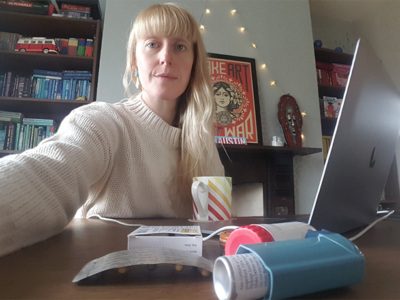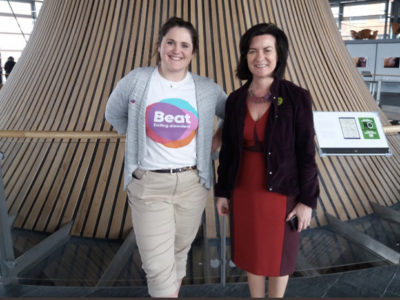CUTS to staff and spending on mental health services for children and adolescents in South Wales have been revealed.
A Freedom of Information (FOI) request by Plaid Cymru shows that Cwm Taf University Health Board cut its total expenditure on community mental health services by £382,000 to almost £2.3m in the last financial year (2014-15).
The number of staff dedicated to children’s mental health services also dropped from 38 to 32.
Cwm Taf UHB provides Children and Adolescent Mental Health Services (CAMHS) across a large area of South Wales for the health boards of Cardiff and the Vale and Abertawe Bro Morgannwg.
The Cardiffian repeatedly asked Cwm Taf UHB to comment on the figures, but they did not respond.
Commenting on the figures in the FOI, Ewan Hilton, Chief Executive of mental health charity Gofal, said: “It’s concerning to see a reduction in spending on child and adolescent mental health services. Young people experiencing mental health problems must have access to quality treatment and support in a timely manner.”
Spending on mental health has been ring-fenced by the Welsh Government since 2008, meaning that its funding was protected. It invests more than £600m a year into mental health services and last year announced an extra £16m-a-year draft budget for 2016-17.
Mr Hilton is encouraged by this promised increase in funding. He said: “We believe it is absolutely crucial that any funding delivers positive outcomes that transform people’s lives for the better.
“A recent PricewaterhouseCoopers review recommended that the Welsh Government should continue to ring-fence mental health spending but should also adopt an outcomes-based approach. The next Welsh Government must make progress towards this aim and demonstrate that their investment is improving lives.”
A Welsh Government review of the financial ring-fencing arrangements for mental health services, published in April 2015, states: “The needs of children and young adults is emerging as a significant area of focus and challenge.
“While new treatments and new technologies may contribute to enhanced outcomes, they may not necessarily be cheaper. It is also recognised that there is a need to change the way in which the service is delivered.”
George Watkins, a 20-year-old student at Cardiff University has suffered from serious mental health problems for the last five years. He has set up a student group called The Mental Youth, which campaigns for better CAMHS services and funding.
Mr Watkins said: “Funding should be targeted more towards children and adolescents. Over half of adults with mental health disorders begin struggling during childhood, so it would be logical to tackle issues like this earlier rather than letting them manifest into harder-to-treat disorders as adults.”
Children’s mental health services are currently in the media spotlight and there have been high-profile campaigns to improve CAMHS care and awareness in the UK.
On Wednesday, the Duchess of Cambridge, Kate Middleton, launched the Young Minds Matter series as Guest Editor of the Huffington Post UK.
The full story of George Watkins – a young sufferer of anxiety and depression.
George Watkins is a 20 year-old student at Cardiff University. He is studying English Literature and he lives in halls. George suffers from severe anxiety and depression.
At 15, George started to struggle at school. He found it difficult to overcome teenage anxiety and the usual stress of education and exams.
He went to a doctor and, after a brief consultation, he was given anti-anxiety medication. George was soon taking 80-100mg of beta-blockers and 20mg of Prozac per day.
“I was so sedated that I pretty much lost about two to three years of my life. I felt the world falling apart around me.”
George took a gap-year after school and then came to Cardiff University in September 2015, deciding it was time to face his demons.
He went to a local GP, who revealed that his anti-anxiety medication could have been lethal because of the high dosages he was taking. This was a turning point for the student.
“I could have dropped dead from my medication. It was shocking.”
He came off all medication and then suffered six weeks of “agonising” withdrawal, which left him collapsing, vomiting and feeling physically and mentally drained.
But George found a surprising community at Cardiff University. Walking around campus, he realised that there are many young people struggling with mental health disorders.
Encouraged by this, George set up a mental health support group for students called The Mental Youth. The group is made up of volunteers and is split into three sections. One section organises petitions to try and increase funding for CAMHS across the UK.
Another section campaigns on campus to increase awareness of youth mental health. The Mental Youth also meets as a weekly support group. It is completely independent of Cardiff University and receives no funding.
George sees his project as a way to supplement the “fantastic” mental health care that the Student’s Union already provides.
“It’s about reaching people and making them feel comfortable to reveal their insecurities.
“It helps me to process my own demons as well. I have up and down days and I write about this on our blog on The Mental Youth website.”
This project has been part of an on-going healing process for George, who still claims: “I don’t know what it feels like to be normal.”
After the medication withdrawal, George started counselling and can now feel his memory and his focus coming back to him.
“I am very wary of commenting on medication because everyone is different. But I am a firm believer that medication should always be a last resort. Young people should be offered counselling.”
He is practising what he preaches by reaching out through The Mental Youth to other students fighting inner demons.
Today, George is being shadowed by a BBC film crew as part of a feature for the BBC Mental Health awareness fortnight. This will be shown on the 10pm news.






